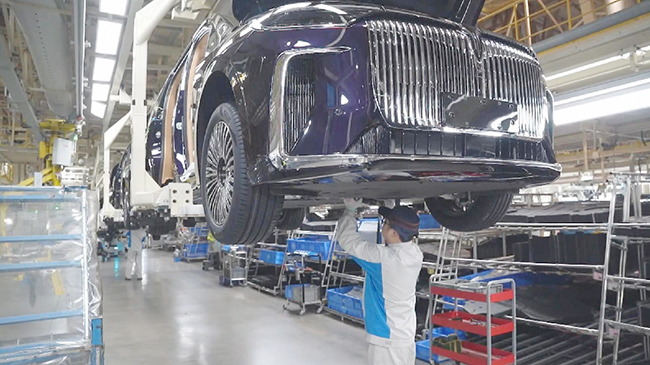Business
 2025/3/10
2025/3/10
 source: International daily
source: International daily
 Print
Print

The electric vehicle (EV) makers in China are accelerating their pace to make products more user-friendly and smarter as more and more of them shift to a forward-looking intelligent strategy to provide better services and experience to customers.
In Wuhan City, capital of central China's Hubei Province, a manufacturing base of Voyah under Dongfeng Motor Corporation has been working at full capacity since the Spring Festival to ensure timely delivery of vehicles, with a new intelligent vehicle rolling off the production line in every 118 seconds.
Lu Fang, CEO of Voyah, said the auto maker will fully embrace an intelligent strategy this year as they see wider application of artificial intelligent (AI) technologies as an emerging and promising trend in the industry.
"We see intelligent vehicles as the best products to apply AI technologies and we think there will be wider application of AI technologies in vehicles as well. As the development of China's new energy vehicle (NEV) industry reaches a critical juncture, intelligence-driven development is definitely where the industry is heading for," said Lu.
Lu added that embracing the emerging trend is vital for the survival of auto makers as customers are increasingly longing for better products and experience.
"We see the arrival of an intelligent era and the transformation will be really fast. I think if a company needs to survive, develop, and to offer better products and experience to customers, it needs to embrace the change," said Lu.
The fast development of China's NEV industry has been promoting the growth of enterprises across the supply chain. Zhixin Semiconductor Company Limited, an electric drive system supplier that produces power semiconductors for NEV makers, has been experiencing fast growth over recent years.
"This is a fully automated power semiconductor production line. Generally speaking, power semiconductor converts the direct current (DC) from the car's battery into alternating current (AC), which then drives the motor, and thus providing momentum for the vehicle. It directly decides the power output and the speed of an EV," said Wu Yingqiu, deputy director of the manufacturing department at Zhixin Semiconductor Company Limited.
Wu said currently the company has been increasing its production capacity to meet the growing demand with its automated production lines operating around the clock to ensure timely deliveries.
"The second production line has a greater production capacity of 400,000 units, bringing our total production capacity to 700,000 units. So far, the number of preorders we had received has doubled compared with last year. And since we resumed production after the Spring Festival, we have been working at full capacity, with both automated production lines running 24 hours a day," said Wu.
This year, the retail sales of China's NEV passenger vehicles are estimated to reach 13.3 million units, marking a 20-percent year-on-year increase.





